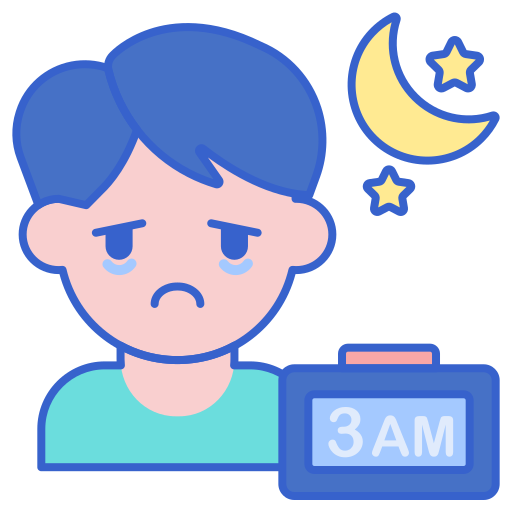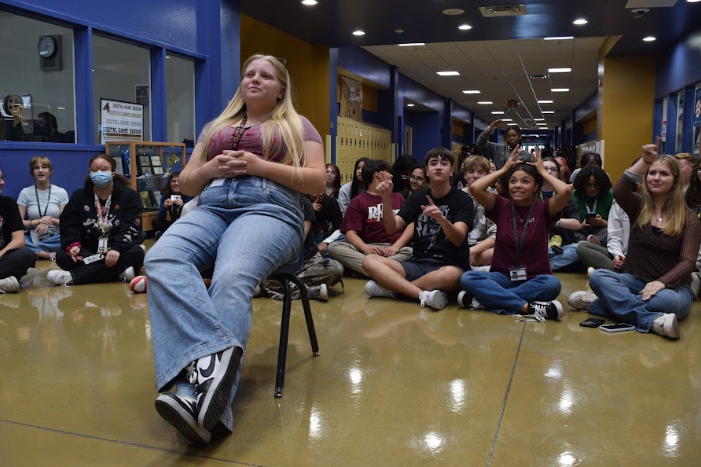A third cup of coffee with deep-set circles under eyes and drowsiness taking over, staying up late has become a normal routine for sophomore Kennedy Taylor. It was already hours past midnight and not long before she had to start getting ready for school. Thoughts of sleep slightly cross her mind, but she is quickly distracted by her phone screen as it casts a bright light on her furrowed brow and droopy eyelids.
Taylor is among a generation of teens growing up chronically sleep-deprived. Disregarding sleep to cram the last bit of studying before a test or finish the next episode of the popular series on Netflix have adverse cognitive effects on mental health. Teenagers of today like senior Chastine Tran, are the vulnerable targets in a society filled with disturbances in everyday life, especially given the distance learning environment.
“Almost every high schooler has experienced sleep deprivation; it’s become a norm now,” senior Chastine Tran said. “I struggled to manage the new responsibilities of high school and would stay up doing homework most nights. Being around students who procrastinate used to influence me to do so as well. A lack of motivation for assignments is extremely harmful towards my sleep schedule as I’ll end up having to complete it later in the night, causing me to stay up.”
Trying to balance both homework and free time in distance learning can be hard to make room to sleep eight hours on a daily basis. With the overwhelming amount of assignments, students like Tran and sophomore Sarah Hatch feel like there never seems to be a break.
“It’s harder to sleep when you’re nervous and I’ve stayed up doing projects that were due,” Hatch said. “Personally, I get nauseous when I’m anxious so it’s harder to sleep when I’m stressed out since I feel like I’ll puke.”
Sleep is vital to high school students as research has shown that people perform better on mental tasks when they are well-rested. Consistent sleep deprivation can hinder students’ learning abilities and develop into multiple unhealthy habits, as Taylor has struggled to sleep naturally.
“When I was young, I had a bedtime, but I’ve always hated being told what to do, so I always stayed up,” Taylor said. “Of course, there are some assignments that take longer, but it’s really just me not wanting to wake up or go to bed at decent times. I lack self-control. I also have trouble sleeping at night because my mind fills with intrusive thoughts. I’ve tried praying, but my brain wanders.”
Though insufficient sleep may often manifest from academic overwork, Psychology 101 teacher Benjamin Lacombe believes that school is only one of the many different reasons for teenage sleep deprivation.
“Although school and homework can be a major contribution to sleep deprivation, it is often the extracurricular activities that accompany school that lead to consistent sleep deprivation,” Lacombe said. “If the students choose to wait to do it at the last minute, then they bring that problem upon themselves. I also try recommending getting their work done during the school week and enjoy the weekends. Many students waste time in class and then pay for it later.”
As sleep time among high school students keeps decreasing, poor grades, anxiety, depression, and suicidal thoughts are at an all-time high. These consequences have an everlasting impact on the individual as Tran notes, a lack of adequate sleep affects her mood and work ethic throughout the day.
“I’ve learned that sometimes you just have to accept defeat and go to sleep even if you didn’t get those assignments done,” Tran said. “At one point or another, you have to prioritize your mental and emotional health. This prevented me from procrastinating so I would look forward to sleeping early. As long as you actively try to fix your bad habits, you’re bound to be happier overall.”
There are also numerous distractions, especially considering many students are at home most of the time. For example, Taylor points out the fact that phones have a negative impact on students due to their invasive nature of notifications, a bright screen, and infinite scrolling.
“Smartphones are very distracting, and addicting,” Taylor said. “It distracts me throughout the day, notifications ringing, reading, checking socials. I read a lot of comics online, and I definitely have trouble putting my phone down when I’m reading one I really enjoy. I always thought it helped me fall asleep, but when I started putting it down and reading an actual book, I’ve noticed I become more tired and sleepy.”
Insufficient sleep and its health consequences may go unrecognized since schools may not emphasize the importance of sleep to overall health as often as they could. Symptoms such as fatigue and intellectual troubles may often be mislinked to life stresses, such as family or social problems, rather than inadequate rest.
“Normally there is always a pretty good reason for abnormal sleeping behavior,” Lacombe said. “As for continually sleeping students, it must be handled differently. I normally start with one-on-one conferences with the student, phone calls home, and then counselor referrals after that. I have found that most of these students are not sleeping because they don’t want to be there, but because they are working to provide for their families.”



![Weighing her options, senior Allyana Abao decides between going on a practice drive or calling an Uber. Though unlicensed, Abao has considered driving to be a significant milestone of teen independence despite alternatives that provide much easier solutions.
“You're able to be independent and not rely on others,” Abao said. “You're able to get a job, get things that you need, go places you need to go. I have so many places that I want to go to and I ask [my family] for so much. I want to be independent to where they know that I can do things on my own, so they know that they don't have to be there for me.”](https://southwestshadow.com/wp-content/uploads/2025/10/IMG_2922-1200x900.jpg)
![Looking at the board, former BSU secretary Christina Altaye begins to prepare for BSU’s second year of Club Feud. This year, “Are You Smarter Than a Ninth Grader?” will be replacing this event. “I think it’s a fun change [to Club Feud],” BSU Activities Director Hellen Beyene said. “[I think] it’s always fun to do something new and different.”](https://southwestshadow.com/wp-content/uploads/2025/10/Screenshot-2025-09-29-11.06.43.png)


!["I will be attending Trunk or Treat [for FCCLA]" junior Crystal Li said. "We're gonna use Mr. Harbeson's car, and we will be [hosting three different activities]."](https://southwestshadow.com/wp-content/uploads/2025/10/IMG_0980-1200x900.png)